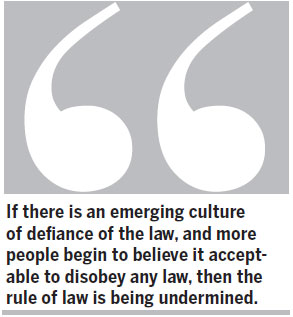What does the rule of law really stand for?
Updated: 2014-11-25 07:31
By Ho Lok-Sang(HK Edition)
|
|||||||
The recent debate over the rule of law in Hong Kong deserves more public attention. I hope both the Hong Kong Law Society and the Hong Kong Bar Association can clarify what actually constitutes the rule of law. This will help educate the public.
First, I refer to recent accusations that the Secretary for Justice Rimsky Yuen and the police have become inappropriately involved in a civil law suit. Civic Party legislator Alan Leong alleged that, instead of clearing the blockades in the occupied areas in accordance with the law, the secretary for justice has been undermining the rule of law by interfering in a private lawsuit. Leong argues that "declaring that the police will be ready to help carry out the injunction" is actually using executive power to erode the rule of law. He recently wrote that the plaintiffs, representing the taxi and minibus industries, had no concrete plans. Moreover, they had not demonstrated any capability to carry out the injunction orders themselves.
Leong noted (citing Justice Henry Litton) that it was interesting that the Court of First Instance would renew a temporary injunction issued three weeks earlier against protesters in Mong Kok and Admiralty on Monday. Leong asked, "Are the plaintiffs prepared to pay for the salaries of thousands of police officers? Who will accept responsibility if anyone gets hurt? Are the plaintiffs ready to accept these responsibilities?" He then accused the Chief Executive and secretary for justice of using a private lawsuit to deal with behavior which is actually criminal. They are doing this to rid themselves of any political responsibility, Leong argued.

These allegations are misleading. It is true that the plaintiffs may not have the ability to clear the barricades. They are relying on bailiffs to carry this out. But there is no indication that police will help clear these barricades. Police will only arrest people who disobey a court order - as this is a criminal offence. There is absolutely no question that private parties can use the police for their own ends.
It is true that given the illegal nature of the occupation, police officers have the legal authority to clear the barricades. Their patience is understandable given that police may not be able to clear the barricades without the use of force. The use of such force will most likely result in injuries to both protesters and police officers. When there is a court order for an injunction, however, the court order should be enforced. If any protester is in contempt of the court then ultimately the police are involved.
Second, I take issue with the argument that as long as we have judicial independence then breaches of the law are not trampling on the rule of law. This view seems to be shared by Lord (Peter) Goldsmith, QC, who was recently speaking at the Our Hong Kong Foundation. He was reported as saying that having individuals disobey the law does not constitute an erosion of the rule of law. This is because all societies have people who break the law, he argued.
Goldsmith is not altogether wrong, but the view that having citizens breaking the law does not in itself undermine the rule of law needs to be qualified. Of course it is true that there are people who break the law everywhere. But if there is an emerging culture of defiance of the law, and more people begin to believe it acceptable to disobey any law, then the rule of law is being undermined. The rule of law cannot stand on judicial independence alone.
Goldsmith is correct in saying that the rule of law is not only concerned with formal aspects of the law, but with the substance of it too. I have argued that the spirit of the law must be based on protecting the public interest. By implication, this must not be anything dictated by political authorities or issued by the state. The rule of law must not be arbitrary. It must follow principles and standards upon which people agree. Moreover, everyone must be equal before the law.
Goldsmith also takes issue with the call, in the recent white paper, for judges to be patriotic. He believes this is a call for judges to consider what is best for the country rather than an objective scrutiny of the evidence and the law when passing legal judgment. But why should there be any difference between what is "best for the country" and "an objective scrutiny of the evidence and of the law"? The white paper repeatedly stressed the need for judicial independence. That will always be our best safeguard against arbitrary political interference.
The author is director of the Centre for Public Policy Studies at Lingnan University.

(HK Edition 11/25/2014 page10)